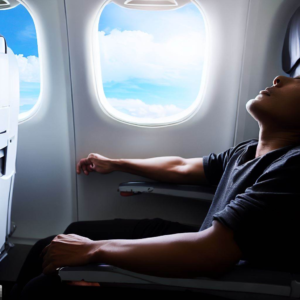Fear of flying is a common phobia that affects millions of people worldwide. According to the National Institute of Mental Health, approximately 6.5% of the population in the United States has a fear of flying.
This fear can range from mild anxiety to full-blown panic attacks, making it difficult for individuals to travel by air. The purpose of this blog post is to provide tips and strategies for overcoming fear of flying.
What is Fear of Flying?
 Fear of flying, also known as aviophobia, is an irrational fear or phobia of flying on airplanes or other aircraft. Symptoms can include sweating, rapid heartbeat, shortness of breath, nausea, and feelings of dread or panic. Fear of flying is different from other phobias because it involves a combination of factors such as claustrophobia, fear of heights, and loss of control.
Fear of flying, also known as aviophobia, is an irrational fear or phobia of flying on airplanes or other aircraft. Symptoms can include sweating, rapid heartbeat, shortness of breath, nausea, and feelings of dread or panic. Fear of flying is different from other phobias because it involves a combination of factors such as claustrophobia, fear of heights, and loss of control.
Common Causes of Fear of Flying
There are several common triggers for fear of flying, including turbulence, claustrophobia, and fear of heights. Past experiences can also contribute to fear of flying, such as a previous flight with severe turbulence or a traumatic event related to air travel. Additionally, media coverage of airplane accidents can increase anxiety and reinforce negative beliefs about air travel.
How to Identify Your Fear of Flying
To identify specific fears related to flying, readers can ask themselves questions such as: What specifically makes me anxious about flying? Is it the takeoff or landing? The turbulence? The feeling of being trapped in a small space? Once readers have identified their specific fears, they can begin to address them directly.
Tips for Overcoming Fear of Flying
Practical tips for managing fear of flying include deep breathing exercises and distraction techniques such as listening to music or watching a movie during the flight. Preparation is also key; researching the flight and packing comfort items such as a favorite blanket or pillow can help reduce anxiety. It can also be helpful to talk to the flight crew and let them know about any concerns or fears.
Professional Help for Fear of Flying
For individuals with severe fear of flying, seeking professional help such as therapy or medication may be necessary. Cognitive-behavioral therapy (CBT) is a common treatment for phobias and can help individuals learn coping strategies and challenge negative beliefs about air travel. There are also support groups specifically for fear of flying that can provide a sense of community and understanding.
Coping Strategies for Fear of Flying
In addition to deep breathing exercises and distraction techniques, other coping strategies for fear of flying include visualization and positive self-talk. Visualizing a successful flight and focusing on positive outcomes can help reduce anxiety. Positive self-talk involves replacing negative thoughts with positive affirmations, such as “I am safe” or “I am in control.”
Benefits of Overcoming Fear of Flying
Overcoming fear of flying can lead to increased travel opportunities and reduced anxiety in other areas of life. It can also provide a sense of accomplishment and empowerment, as individuals face their fears and overcome them. Focusing on the positive outcomes of facing fears can help motivate individuals to take action.
In conclusion, fear of flying is a common phobia that can be managed with practical tips, professional help, and coping strategies.
By identifying specific fears related to flying and taking steps to address them directly, individuals can overcome their fear and enjoy the benefits of air travel. It is important to remember that everyone’s journey is different, and finding what works best for each individual is key to success.

